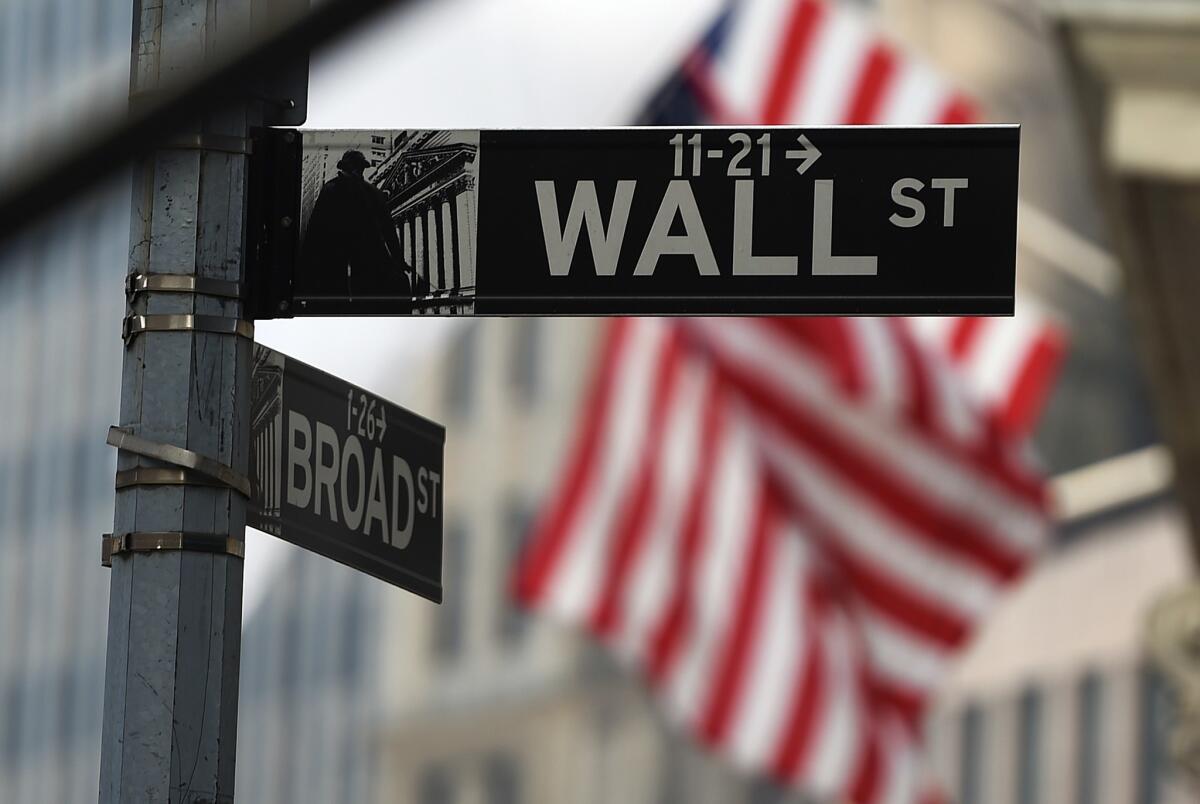Banks lead gains for stocks on Wall Street in jumpy trading

- Share via
Financial companies led stocks broadly higher on Wall Street on Thursday as traders welcomed news that the Federal Reserve and other regulators are removing some limits on the ability of banks to make investments.
The S&P 500 climbed 1.1% following a jumpy day of trading. At one point, the index was down 0.9% before the rally strengthened toward the end of the day. The gains reversed some of the S&P 500’s losses from a day earlier, when the market had its biggest drop in nearly two weeks.
Banks surged after the Fed and four regulatory agencies announced they’re going to change a rule that has limited banks’ ability to make investments in such areas as hedge funds. The rule change could free up billions of dollars in capital in the banking industry.
Technology and healthcare stocks also helped lift the market, outweighing losses in utilities. Bond yields fell, a sign of caution in the market.
The Dow Jones Industrial Average rose 299.66 points, or 1.2%, to 25,745.60. The Nasdaq, which hit an all-time high earlier this week, gained 107.84 points, or 1.1%, to 10,017. The Russell 2000 index of small company stocks notched the biggest gain, climbing 23.57 points, or 1.7%, to 1,413.31.
The S&P 500 added 33.43 points to 3,083.76. The benchmark index is on pace for its best quarter since the fourth quarter of 1998.
Until this week, markets had been mostly rallying on hopes that U.S. states and regions around the world could continue to lift the spring lockdowns put in place to slow the spread of the coronavirus.
Recent economic data have been positive, helping fuel the cautious optimism. But a rise in new infections is stoking worries that the reopening of businesses may have to be curtailed again, delaying the economy’s recovery.
The Commerce Department said Thursday that the U.S. economy shrank at a 5% rate in the first three months of the year. A far worse decline is expected for the current quarter due to the pandemic. The Labor Department said an additional 1.5 million laid-off workers applied for unemployment benefits last week. That marks the 12th straight drop, a sign that layoffs are slowing, but remain at a painfully high level.
Macy’s slid 4.1% after the department store operator announced it is laying off 3,900 corporate staffers, or roughly 3% of its overall workforce, as the pandemic takes a financial toll on the retailer’s sales and profits. Like many of its nonessential peers, the retailer was forced to close its physical stores to curb the spread of the coronavirus, evaporating sales.
On a more encouraging note, the government said orders to American factories for big-ticket goods rebounded last month from a steep pullback in April and March as the economy began to slowly reopen.
The mixed data come amid growing alarm over a surge in cases of COVID-19. Hospitalizations and caseloads have hit new highs in over a half-dozen U.S. states, including California, Florida and Texas, where the governor said Thursday that the state would pause its aggressive reopening as it deals with a surge in cases and people in need of being hospitalized. The daily number of confirmed cases in the country closed in on the peak reached in late April.
JPMorgan, Bank of America and Citigroup all rose more than 3% as investors cheered word that the Fed and other bank regulators have finalized a rule that will ease restrictions imposed by the Volcker Rule, which was part of the overhaul of banking regulations approved in the Dodd-Frank Act passed by Congress in 2010 in an effort to curtail excesses that had led to the 2008 financial crisis.
President Trump had campaigned in 2016 on rolling back what he saw as excessive regulation of the banks that had weighed on the economy by preventing the banks from making loans to qualified borrowers.
After the close of regular trading, the Fed said it was ordering the nation’s 34 biggest banks to suspend buybacks of their own stock and cap dividend payments until Sept. 30 so they can shore up their defenses in the event of a potentially damaging recession. The announcement came as part of the Fed’s annual “stress tests,” which showed that in a worst-case scenario involving the U.S. economy being ravaged by the pandemic, the banks would collectively lose roughly $700 billion.
Bond yields fell. The yield on the 10-year Treasury note held at 0.68%. The yield tends to move with investors’ expectations for the economy and inflation.
In energy trading, benchmark U.S. crude oil rose 1.9% to settle at $38.72 a barrel. Brent crude, the international standard, gained 1.8% to $41.05 a barrel.
After broad losses in Asia overnight, markets closed higher in Europe. Germany’s DAX rose 0.7%, while the CAC 40 in Paris picked up 1%. London’s FTSE gained 0.4%.
More to Read
Inside the business of entertainment
The Wide Shot brings you news, analysis and insights on everything from streaming wars to production — and what it all means for the future.
You may occasionally receive promotional content from the Los Angeles Times.










